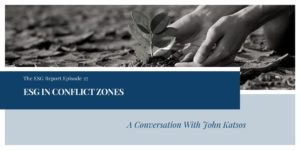
John Katsos is a scholar, educator, and writer. His mission is to ‘help people learn to start and manage better, more sustainable businesses and be better humans.’ He is also the co-author of Business, Peacebuilding and Sustainable Development. He joins Tom Fox in this episode of the ESG Report to discuss the importance of ESG and due diligence, particularly in conflict zones.
Due Diligence in Conflict Zones
Tom asks John, “How do you counsel companies to think through due diligence in conflict zones?” First, make sure that you can do the due diligence, John responds, as you may not have access to the data you need in many conflict zones. Companies in these countries need to have a “very clear red line” if they can’t do due diligence, he continues. Assume that money is going to people and places it shouldn’t, and have a process for withdrawing or shutting down operations if necessary. Corporations should ensure that workers are not being exploited: what is happening on the ground should be what’s actually in workers’ contracts, John tells Tom. “There’s lots of places where the contract will say one thing, and the contract they’re providing for due diligence might not be the same document they’re providing even to the government,” he remarks.
Reporting on ESG
Can companies in conflict zones start to make a difference around climate change, and how do they report it, Tom asks John. Reporting is the easy part, John replies, as the reporting structures and benchmarks already exist. It would be harder to start from scratch. Tom comments that he believes 80% of ESG is what you’re doing already. Companies may be doing more ESG than they realize. John agrees; he adds that siloing is a problem in that data may not be shared across the organization. “That’s why I think we see in a lot of companies a shift to hiring more data managers, and hiring more information specialists who can help bridge those types of gaps.” More companies are pushing for formal reporting, John remarks; he is also seeing more intent and financing toward reporting related to the UN sustainable development goals. Companies “are much more focused on trying to align what they’re doing with what not only other companies are doing, but with what governments and civil society actors are doing on these sustainable development goals,” John says.
Corporate Responses in Conflict Zones
Tracking companies before, during, and after conflict is challenging, John tells Tom. Reliable data is hard to come by, and often casualty data is the best they have. He explains, “What that means from a studying standpoint is a lot of it is going to be secondary or indirect to what we actually want to measure. So when we look at things like the impact of a CSR policy or program in a conflict zone, it’s often hard to know how much of an impact that program has, because there’s so many other things going on around it.” Tom asks if there’s a role for for-profit companies in conflict areas in battling corruption. It’s everyone’s responsibility, John points out. “Everyone else is impacted by conflict. And so everybody else should be at the table trying to figure out ways to deal with this. And that includes for-profit companies.”
Resources
John Katsos on Website | LinkedIn | Twitter


